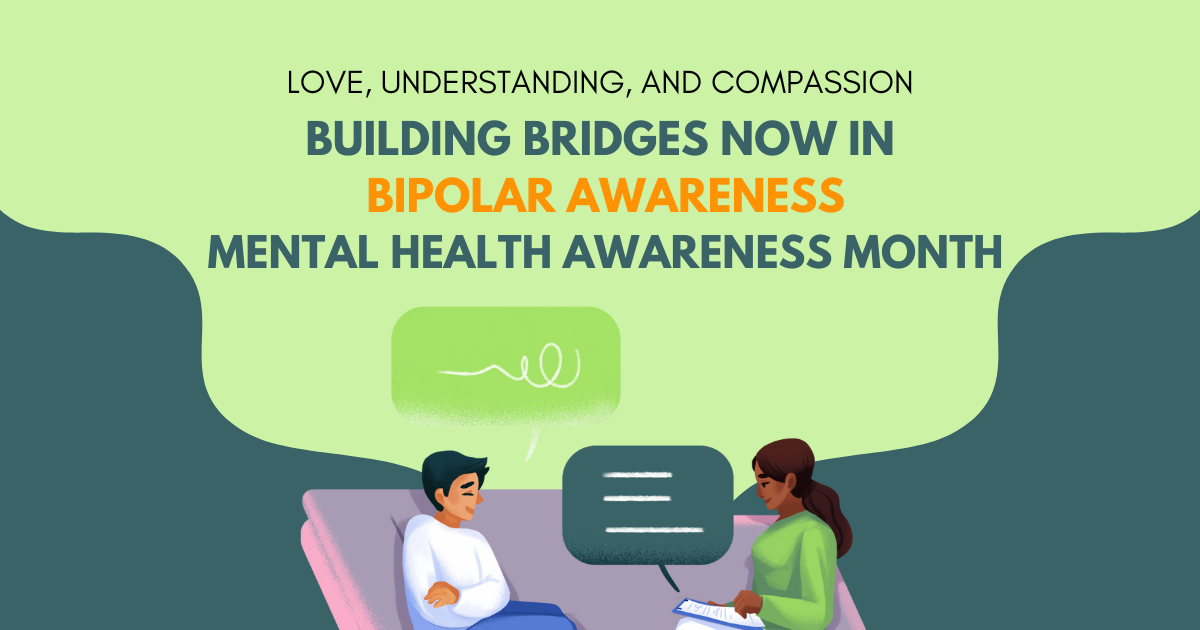Introduction: Embracing Bipolar Awareness Mental Health Awareness Month
In a world where understanding and compassion can make all the difference, embracing bipolar awareness becomes paramount. Let’s delve into the depths of this important topic during Mental Health Awareness Month.
Table of Contents
ToggleUnderstanding Bipolar Disorder
Defining Bipolar Disorder
Bipolar disorder is a mental health condition characterized by extreme mood swings that include emotional highs (mania or hypomania) and lows (depression). These shifts in mood, energy, and activity levels can have a profound impact on individuals’ lives.
Symptoms and Impact on Individuals
Individuals with bipolar disorder may experience a range of symptoms, including manic episodes marked by elevated mood, increased energy, and impaired judgment, as well as depressive episodes characterized by sadness, hopelessness, and loss of interest in activities. These mood swings can disrupt relationships, work, and daily functioning.
The Importance of Mental Health Awareness Month
Significance of Mental Health Awareness Month
Mental Health Awareness Month serves as a crucial platform for raising awareness about mental health issues, reducing stigma, and promoting understanding and support for individuals living with mental illness, including bipolar disorder.
Spreading Understanding and Compassion
During Mental Health Awareness Month, communities come together to educate the public about the realities of living with mental illness and the importance of empathy, compassion, and support for those affected. By fostering open dialogue and promoting understanding, we can break down barriers and build bridges of empathy and support.
Building Bridges of Support
Creating a Supportive Environment
Building bridges of support starts with creating a safe and supportive environment where individuals feel comfortable sharing their experiences and seeking help without fear of judgment or stigma. By fostering open communication and offering unconditional support, we can create a sense of belonging and empowerment for those living with bipolar disorder.
Empowering Individuals with Bipolar Disorder
Empowering individuals with bipolar disorder involves providing access to resources, treatment options, and support services that help them manage their condition effectively and live fulfilling lives. By empowering individuals to take control of their mental health journey, we can promote resilience, self-advocacy, and empowerment.
Breaking Stigma and Misconceptions
Challenging Stigma Surrounding Mental Health Awareness Months
Stigma surrounding mental health continues to be a significant barrier to seeking help and receiving adequate support for individuals living with bipolar disorder. By challenging stereotypes, dispelling myths, and promoting accurate information about bipolar disorder, we can combat stigma and discrimination in our communities.
Educating the Community about Bipolar Disorder
Education plays a vital role in raising awareness and promoting understanding of bipolar disorder. By educating the community about the symptoms, causes, and treatments of bipolar disorder, we can foster empathy, reduce fear, and encourage acceptance and inclusion for individuals living with the condition.
Promoting Love and Understanding
Encouraging Empathy and Compassion
Promoting love and understanding involves fostering empathy, compassion, and acceptance for individuals living with bipolar disorder. By acknowledging the humanity and dignity of each person, we can create a culture of empathy and support that celebrates diversity and inclusivity.
Fostering Acceptance and Inclusivity
Fostering acceptance and inclusivity means creating a society where individuals living with bipolar disorder are valued, respected, and included as equal members. By embracing diversity and celebrating the unique strengths and contributions of each individual, we can build a more compassionate and inclusive world for all.
Resources and Support for Bipolar Individuals
Accessing Mental Health Services
Accessing mental health services is essential for individuals living with bipolar disorder to receive timely diagnosis, treatment, and support. By connecting individuals with bipolar disorder to mental health professionals and treatment options, we can promote recovery and improve quality of life.
Finding Community Support Groups
Community support groups provide valuable peer support, encouragement, and understanding for individuals living with bipolar disorder. By connecting with others who share similar experiences, individuals can find comfort, validation, and inspiration on their mental health journey.
Taking Action: How You Can Help
Supporting Loved Ones with Bipolar Disorder
Supporting loved ones with bipolar disorder involves offering empathy, encouragement, and practical support during both manic and depressive episodes. By listening without judgment, offering a helping hand, and being a source of comfort and understanding, you can make a positive difference in their lives.
Advocating for Mental Health Awareness Months
Advocating for mental health awareness months means speaking out against stigma, discrimination, and barriers to mental health care. By raising your voice, sharing your story, and promoting understanding and acceptance, you can help create a more compassionate and supportive society for individuals living with bipolar disorder.
Conclusion
Spreading love and compassion in bipolar awareness is not just an obligation but a privilege. By fostering understanding, challenging stigma, and promoting empathy and support, we can build bridges of love and compassion that uplift and empower individuals living with bipolar disorder.
Frequently Asked Question ( FAQs )
1. What are the different types of bipolar disorder?
Ans. Bipolar disorder is classified into several types, including bipolar I disorder, bipolar II disorder, cyclothymic disorder, and other specified and unspecified bipolar and related disorders.
2. Is bipolar disorder a lifelong condition?
Ans. Bipolar disorder is a chronic condition that requires ongoing management and support. While there is no cure for bipolar disorder, with proper treatment and support, individuals can lead fulfilling and productive lives.
3. What are some common triggers for bipolar episodes?
Ans. Common triggers for bipolar episodes include stress, sleep disturbances, substance abuse, changes in routine or environment, and life events such as loss or trauma.
4. How can I support a loved one with bipolar disorder?
Ans. Supporting a loved one with bipolar disorder involves offering empathy, encouragement, and practical support, as well as educating yourself about the condition, communicating openly, and helping them access professional treatment and support services.
5. Where can I find more information and support for bipolar disorder?
Ans. There are many resources available for individuals living with bipolar disorder and their loved ones, including national organizations, online support groups, helplines, and mental health professionals specializing in bipolar disorder.










